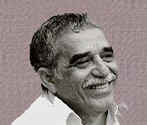"Un día de estos"
Gabriel García Márquez
Introduction
Aurelio Escovar is introduced as a poor dentist without a
degree. He is busy polishing false teeth early one morning when the mayor
arrives to see him. At first he refuses to see this would-be patient, until the
mayor, who has been suffering severe toothache for five days and is desperate,
threatens to shoot him. Eventually the dentist lets him in, examines him, and
then removes the infected wisdom tooth, without anesthesia.
We realize that the dentist has deliberately made the mayor
suffer all this time, and he gives the reason as he pulls out the tooth, saying
"Now you'll pay for our twenty dead men." When the mayor has recovered
and wiped his tears, he leaves, telling the dentist to send the bill. When
Escovar asks whether to send the bill "To you or the town?," the mayor
replies, "It's the same damn thing."
Commentary
Marquez captures the peculiar nature of medical (or in this case
dental) power in this tale of manipulation. Escovar the dentist is not a
powerful man in this town; he is not wealthy and his office is poorly supplied
and dirty. The mayor is the epitome of apparently corrupt, even murderous,
political power. But the infection entirely reverses this hierarchy, placing the
mayor at the dentist's mercy.
The power is profound, but temporary, for as soon as Escovar has
removed the tooth, the mayor is released from him--looking at the extracted
tooth, the mayor "failed to understand his torture of the five previous
nights"--and when he leaves, the mayor reiterates that he and the town are
"the same thing," that his power extends beyond himself. Nonetheless,
we are left with a strong reminder of the democracy of at least some kinds of
bodily suffering, and of the access this gives the medical professions to an
extraordinary kind of control over the experiences of others.
Finally it is as if the dentist, no longer able to withhold
treatment (not because the mayor threatens to shoot him, but simply because he
is a dentist and a professional), tells himself that hurting the mayor will
affirm his own power for revenge or political resistance. In fact, though, his
treatment is so effective that he releases the mayor both from the pain and from
his grasp and restores the very situation he, the dentist, abhors. As the title
implies, though, he seems to have learnt something new about his own power, that
"one of these days . . . . "
This literature summary comes from:
